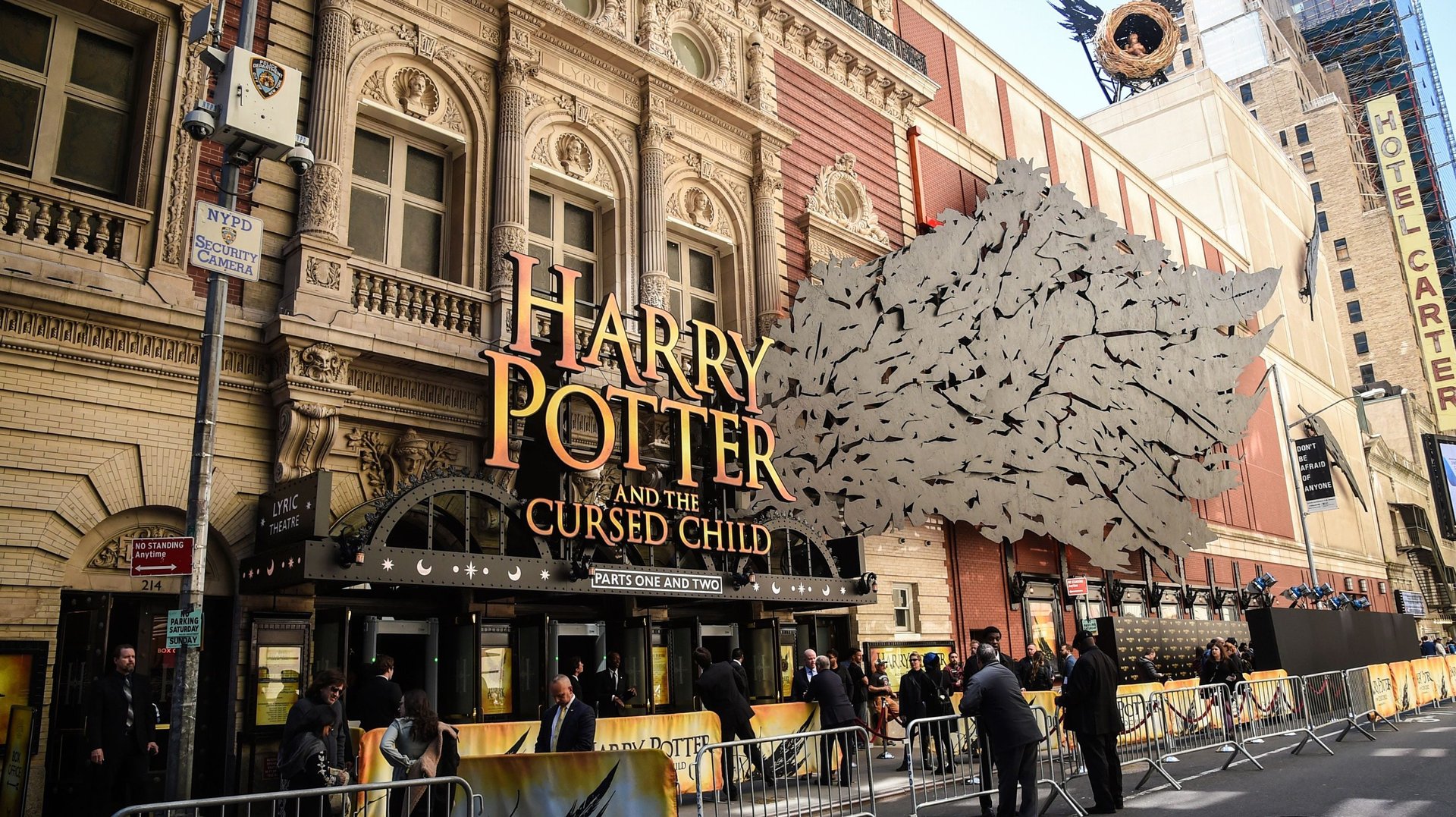“Harry Potter” has reduced American theater critics to blissed-out nonsense
The reviews are in for Harry Potter and the Cursed Child, Parts I and II on Broadway, which opens this week. According to critics, the show is “a triumph of epic proportions”; the pacing is “a master class in brisk but lucid exposition”; the lighting is “game-changing”; the acting “exquisitely classic.”


The reviews are in for Harry Potter and the Cursed Child, Parts I and II on Broadway, which opens this week. According to critics, the show is “a triumph of epic proportions”; the pacing is “a master class in brisk but lucid exposition”; the lighting is “game-changing”; the acting “exquisitely classic.”
The show, performed in two parts, opened in London in 2016 to rave reviews, along with a script-book that became a mega-bestseller. The story is written by Harry Potter author J.K. Rowling, along with Jack Thorne and John Tiffany, and directed by Thorne. The New York production is at the Lyric Theatre.
Reviewers of the show, which opened last night, are so beside themselves with accolades they’ve been reduced to breathless blathering, universal praise in the form of gibberish. (There were exceptions: Richard Lawson of Vanity Fair was critical in his review, while Slate’s Dan Kois has mixed feelings.)
The overall effect is a reminder of just how difficult it can be to recreate music or physical drama in words for an unfamiliar reader, without falling into the criticism trap of cliché, nonsensical lyricism, weird metaphors, and $10 words. Variety’s Marilyn Stasio is self-aware of the potential for bad writing, and opens her review instead:
This is no time for bogus expressions of sophistication. So, let’s just say: Hooray!
Here’s the best of the gobbledygush by theme:
Overall
- “the new gold standard for fantasy franchise entertainment on Broadway” (New York Times)
- “Parsed as a text, Cursed Child is a theme-park whirligig that dizzyingly checks all the boxes you’d expect to see of a show that bears the famous Potter name; parsed as a production, it’s a technical achievement that redefines the possibilities of theatre” (Entertainment Weekly)
- “one of the most plot-heavy texts to appear on Broadway since melodrama became déclassé and suspense is the spell that keeps it whooshing along, it would be unsporting to say much more” (The Guardian)
- “a form that is exuberantly, flabbergastingly, Playbill-shreddingly theatrical” (The Guardian)
- “bracingly, piercingly new” (Deadline)
- “Broadway will never be the same” (Entertainment Weekly)
- “a triumph of epic proportions, not only heaven for Potterheads, but a marvel of stagecraft that will soon be the stuff of legend” (Rolling Stone)
- the play “seizes the stage by divine right” in “some kind of miracle” (Rolling Stone)
- [the writers and directors] “achieve the near impossible: They mount a persuasive case that this story we all know from novels and/or movies only now has found its nonpareil medium” (The Hollywood Reporter)
- “it’s not hyperbole to call the show sheer magic” (The Hollywood Reporter)
Pace
- “collapsing years into minutes and making dreams feel eternal, and more vivid than reality” (New York Times)
- “everything that happens onstage seems as improbably fluid as, well, time itself” (New York Times)
- “a master class in brisk but lucid exposition”
(The Hollywood Reporter)
Magic tricks and special effects
- “spellbinding storytelling with stagecraft that brings classic illusions into line with the demands of audiences used to all sorts of convincing special effects and digital hocus pocus” (Deadline)
- “ingenious theatricality can make audiences believe that magic is real” (Slate)
- “visions of pure enchantment that send shivers down your spine when they’re not breaking your heart” (Rolling Stone)
- “eyes will pop and jaws will drop” (Rolling Stone)
- “It’s unlike anything seen on Broadway before” (People)
Acting
- Albus Potter and Scorpius Malfoy, played by Sam Clemmett and Anthony Boyle, are “formidable individually but meteoric together.” They have “the kind of friendship that trounces ostracization, that vanquishes evil, that draws power from the triumph of an inside joke as much as a shared tragedy.” Boyle has a “a ferocious nerve and mischievous wit; he’s funny and heartbreaking and applies a vexing if effective quantity of outbursts to service his character’s epiphanic moments” while Clemmett is a “an understated wonder.” (Entertainment Weekly)
- “Parker’s tragic performance [as Harry Potter] is exquisitely classic and offers a cogent, necessary baseline for the entire production” (Entertainment Weekly)
- “irresistibly anxious” Jamie Parker as Harry Potter; “the marvelous” Noma Dumezweni as Hermione; “delightful” Paul Thornley as Ron Weasley; a “show-stealing performance” by Anthony Boyle as Scorpius Malfoy (New York Times)
- “the acting infinitely superior” (The Hollywood Reporter)
Staging
- “swift, stylish tonal landgrabs, floating tableaus filled with suitcase choreography” (Entertainment Weekly)
- “This stately mansion is the work of the ace set designer Christine Jones and has been shrouded in beckoning, velvety and inventively concealing shadows by Neil Austin’s lighting” (New York Times)
- “game-changing lighting from Neil Austin” (Entertainment Weekly)
- “wittily transformative costumes” (New York Times)
- “whipping their wizards’ capes around disappearing scenery and moving with hypnotic grace and speed through supple transitions, backed by composer Imogen Heap’s propulsive underscoring” (The Hollywood Reporter)
- “a Lyric Theater kitted out in a riot of pomo-Victorian splendour” (The Guardian)